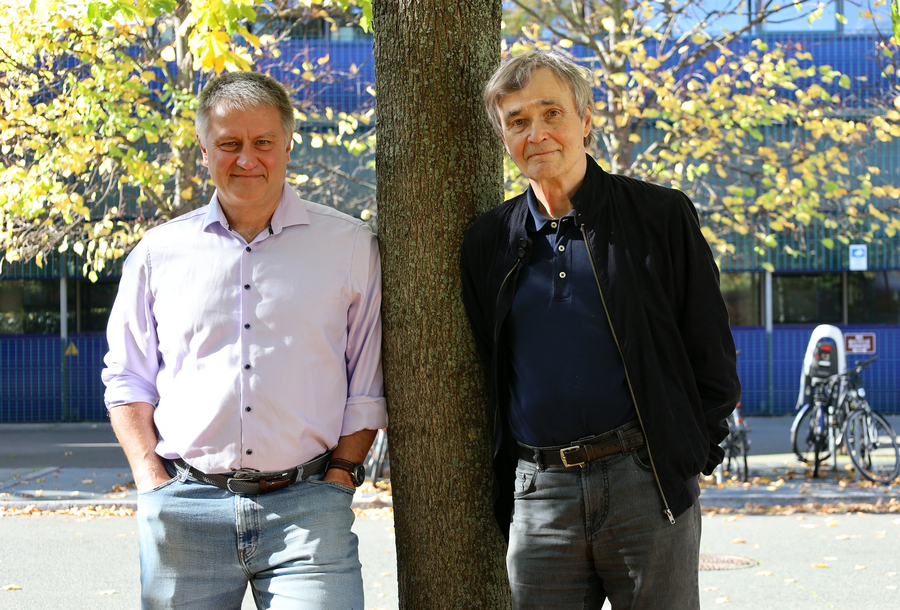
Andrej Shevchenko (left) and Kai Simons (right). © MPI-CBG / Katrin Boes
The Biochemical Analytics Prize 2022 of the German Society for Clinical Chemistry and Laboratory Medicine e.V. (DGKL), endowed by Sarstedt AG & Co.KG with 50,000 euros, was awarded to Kai Simons, Director Emeritus at the Max Planck Institute for Molecular Cell Biology and Genetics (MPI-CBG), Dresden, and Andrej Shevchenko, research group leader at the MPI-CBG, as well as transfusion physician Andreas Greinacher from Greifswald University Medical Department. The scientists receive the prize for the development of a high-resolution quantitative lipid profiling and the discovery of the causes of vaccine-induced cerebral vein thrombosis. Half of the prize money will go to Andreas Greinacher and half to Kai Simons and Andrej Shevchenko.
Congratulations!
Together with DNA and proteins, lipids comprise an important class of biomolecules. However, lipids composition and how it is affected by diverse pathophysiological processes remains poorly understood. The human lipidome, a full constellation of lipids in the human body, may comprise over 100,000 unique lipid species. Kai Simons and Andrej Shevchenko worked together to develop the quantitative shotgun lipidomics platform. Shotgun methodology does not use front-end separation of total lipid extracts and relies on high-resolution mass spectrometry to identify the molecular species of lipids and determine their absolute (molar) quantities. Hence, shotgun lipidomics excels and enables molecular diagnostics of a wide spectrum of metabolic disorders.
Andreas Greinacher and his research team discovered the cause of “VITT syndrome-vaccine-induced immunogenic thrombotic thrombocytopenia (VITT),” which occurs after a vaccination with adenovirus vector-based COVID-19 vaccines. The discovery of “VITT syndrome,” the development of a detection method, the clarification of the mechanism, and the identification of effective treatment drugs meant that severe complication rates could be reduced by more than 90 percent.
Professor Harald Renz, President of the German Society for Clinical Chemistry and Laboratory Medicine, said: “We are once again pleased to be able to honour three outstanding scientists this year from around the world, who absolutely fulfil the award’s demanding criteria. Their scientific contribution is setting the standard for chemical analysis and is helping to improve the healthcare of millions of people.”
About the Biochemical Analytics Prize
The Biochemical Analytics Prize has been conferred every two years since 1970 by the German Society for Clinical Chemistry and Laboratory Medicine e. V. (DGKL) for outstanding scientific achievements in the field of biochemical and molecular analytics. The award recognises methodological advances as well as important discoveries that has been gained using modern analytical methods in the field of biological sciences, especially clinical chemistry and clinical biochemistry. The award is sponsored by the globally active company SARSTEDT Group.
Six Nobel prize laureates and several scientists of Max Planck Society, such as Nobel Laureates Emmanuelle Charpentier, Svante Pääbo and Georges J.F. Köhler, as well as Franz-Ulrich Hartl, Wolfgang Baumeister and Matthias Mann, have already been honoured with this award.